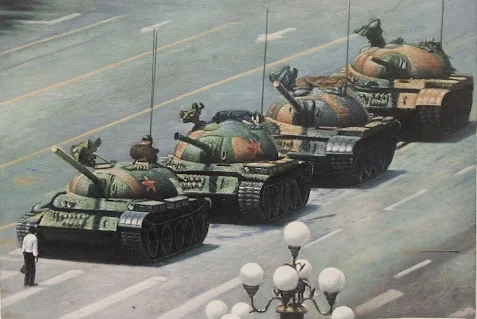"Wearing a simple white shirt, dark pants, and carrying two shopping bags," he blocked a column of a Chinese military tank (Dunleavy). The Tank Man, known as the "Unknown Rebel," emerged into the global media spotlight after the violent crackdown (Iyer). This incident was a series of protests in Beijing, China, 1989, led by "university students, intellectuals, and workers" (Ray). These demonstrations aimed to seek "democratic, political, social, economic and other reforms" and garnered widespread global attention (The Editors of Encyclopaedia Britannica). The protests escalated from a scale of "100,000" students to "1 million" people participating (The Editors of Encyclopaedia Britannica). Ultimately, the tragic incident culminated in "Chinese soldiers and police storming Tiananmen Square, firing live rounds into the crowd" (History.com Editors), resulting in "hundreds to thousands of protesters being killed" (History.com Editors). However, to this day, the Chinese government has implemented severe suppression and censorship measures to control the dissemination of information and conceal the truth about the Tiananmen Square incident. This essay will explore how repression and censorship measures have instead strengthened the public's memory of the incident and intensified their desire for the truth.
"Tiananmen Square: Do you exclusively paint Thomas Kinkade paintings?" by mandiberg is licensed under CC BY-SA 2.0 .
The Chinese government's measures of information control and censorship have been crucial tactics adopted by the government following the "Tiananmen Square incident" (The Editors of Encyclopaedia Britannica). "From the outset of the incident, the Chinese government's official stance was to downplay its significance and attempted to suppress references to it In the years since the incident" (The Editors of Encyclopedia Britannica). The identity of the Tank Man remains unconfirmed as the Chinese authorities have consistently refused to disclose his name or whereabouts (Dunleavy). According to the detailed description provided by Dunleavy and History.com Editors, in 2019, over "3,200 words" related to the incident were censored, and images of the Tank Man are still prohibited by the authoritarian Communist Party regime in China. The Chinese government has also resorted to threatening artists to prevent the exhibition of artwork related to this incident, further restricting the discussion and display of the event (Gera). These information control and censorship measures have gradually led to the distortion, erasure, and suppression of the truth, further fueling the public's strong desire for remembrance and the pursuit of justice regarding the event. People worldwide have begun to initiate freedom rallies to commemorate the victims of this incident.
The prohibition and suppression of public commemoration have consequently become another important strategy adopted by the government following the Tiananmen Square incident. "The Chinese government prohibited journalists from entering Tiananmen Square and blocked access to foreign news sites and social media" (The Editors of Encyclopaedia Britannica) on the anniversary of the massacre incident to restrict global understanding and attention towards the event. It is worth mentioning that Hong Kong is the last region in China where commemorating the Tiananmen Square incident is still permitted (Leung). "The residents of Hong Kong have held an annual vigil on the anniversary of the crackdown, even after Hong Kong reverted to Chinese administration" (The Editors of Encyclopaedia Britannica). However, in recent years, the Hong Kong government has imposed stringent measures to limit activities related to the event. As reported by Leung, organizers, and participants have been subject to arrest by the Hong Kong government.
Despite the prevention of anniversary commemorations, the indomitable spirit of the people prevails, as their sincere desire for truth and the unwavering pursuit of justice and fairness for the victims continues to grow. People have not wavered in the face of repression. They continue to express their discontent with the Chinese government's handling of the Tiananmen Square incident through various forms. According to the interviewee mentioned by Leung, "More than 30 years of commemorating the 1989 protests had made it a part of life" (Leung). Despite the risk of being arrested, citizens still choose to privately mark this event on the anniversary by entering Victoria Park. Chan, the leader of the Social Democratic Alliance, commemorated the event in a low-key manner to express his remembrance; however, he was taken away by the police (Leung). Badiucao, who has been in exile in Australia for many years, organized an exhibition of artworks depicting the 1989 Tiananmen Square massacre despite his family being threatened by the Chinese government (Gera). Mr. Wong, a citizen of Hong Kong, stated, "It's all ingrained in our subconscious that we should care and practice our sympathy towards other people who are yearning for democracy and freedom" (Leung).
The Chinese government's repression and censorship measures, rather than erasing the memory of the incident, have had the opposite effect of ingraining it even deeper in the public consciousness and fueling a stronger yearning for the truth. The incident passed more than 30 years ago. The Chinese government continues to smear and suppress any mention of this incident, evading responsibility for the violent incident. However, people in China and around the world continue to engage in various forms of commemorative activities. The legacy of Tiananmen, the memories and reminders it brings, will continue to reside in the minds of this generation of Chinese people.
References:
Dunleavy, Brian. “Who Was the Tank Man of Tiananmen Square?” HISTORY, 1 June 2018, www.history.com/news/who-was-the-tank-man-of-tiananmen-square.
Gera, Vanessa. “Exhibition by Chinese Dissident Artist Opens in Warsaw despite Pressure from China | Britannica.” Www.britannica.com, 16 June 2023, www.britannica.com/news/594820/658f1c56ef1263a7a246d09c1a0a07fb.
History.com Editors. “Tiananmen Square Protests: 1989, Massacre and Tank Man - HISTORY.” HISTORY, 31 May 2019, www.history.com/topics/asian-history/tiananmen-square.
Iyer, Pico. “The Unknown Rebel.” TIME.com, 13 Apr. 1998, content.time.com/time/magazine/article/0,9171,988169,00.html.
Leung, Kanis. “China Tightens Access to Tiananmen Square, 32 Detained in Hong Kong on Anniversary of 1989 Protests | Britannica.” Www.britannica.com, 4 June 2023, www.britannica.com/news/594820/16fe986d4caffd4e76c54a6e879c205a.
Ray, Michael. “Tank Man | Significance, Photo, China, & Identity | Britannica.” Www.britannica.com, 18 May 2023, www.britannica.com/biography/Tank-Man.
The Editors of Encyclopaedia Britannica. “Tiananmen Square Incident | Summary, Details, and Facts.” Encyclopedia Britannica, 21 June 2023, www.britannica.com/event/Tiananmen-Square-incident.


Comments
Post a Comment